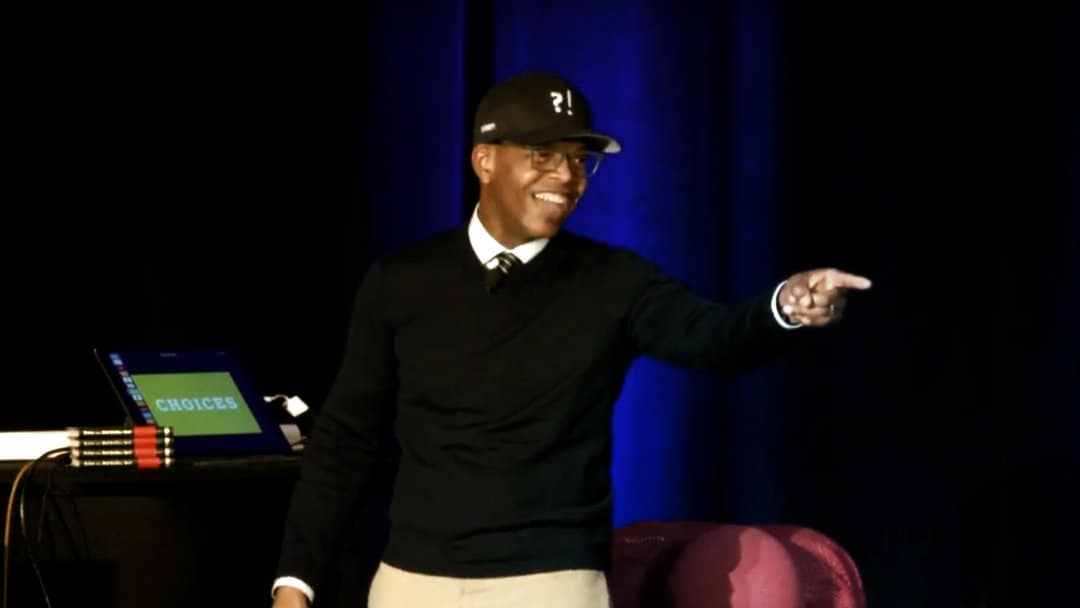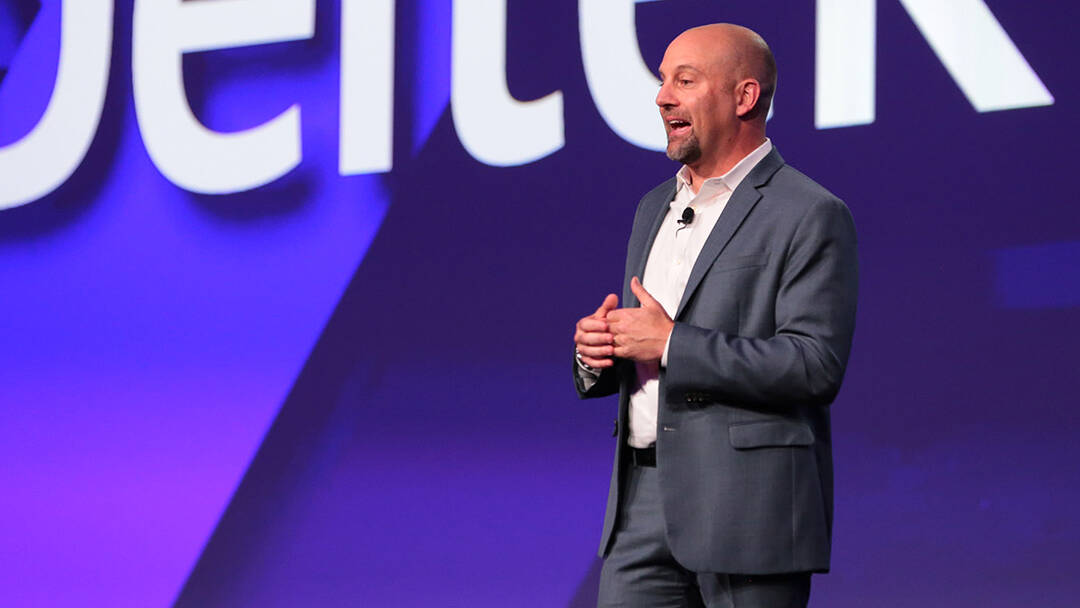Editor’s Note: Smartsheet hosts an ongoing speaker series for its employees to bring new ideas to our global team. The series is an opportunity for employees to engage with experts on effective communication, unconscious bias, and other topics that are both professionally and personally relevant to our employees and team culture. Past speakers include Kim Scott, Dr. Mahzarin Banaji, Kevin Carroll, and Mike Robbins.
Before founding his own company, Kevin Carroll led and contributed to teams of all shapes and sizes. He served in the Air Force as a translator, was Head Athletic Trainer for the Philadelphia 76ers, and facilitated change at Nike as a “Katalyst” — a role where he helped leaders and teams reach their creative potential through balancing play and productivity.
Suffice to say, Mr. Carroll knows the value of how clear communication, visibility, and creative confidence make teams of all types productive.
After giving a guest talk at Smartsheet, he took time to chat with us about his philosophy on structured play, what makes for successful teams, and how leaders can create a positive environment for speedier business execution. Out of this talk emerged three traits that impactful leaders need to build trust and stay motivated.
In addition, he shared how to build an inclusive, winning workplace culture, and some relevant books that all leaders should read.
Related
5 Mistakes Leaders Make That Slow Down Business
Trait #1: Stay Curious & Creative
Stephen Danos: How can leaders and individuals integrate work and play?
Kevin Carroll: The New York Times Sunday Review recently published Forget a Fast Car. Creativity Is the New Midlife Crisis Cure, an encouraging article about people rediscovering the importance of finding joy, and having fun, but looking at it from a creative standpoint.
The author talks about how people are starting to take classes in fine arts, and doing little stretch studies in photography, all these creative endeavors, and it's actually reawakening their creative spirit and their joy for their work.
Not everybody gets to be on a creative team, but what I always say is your work could be availing the play that you do outside of it. With that mindset, why would you begrudge your work? Why would say, "Oh, it's Monday and I've got to go to work?"
I always remind people, "First of all, you've got a Monday. Second, that job you have, whether it is the end all, be all for you, or it is just a J-O-B, provides economic freedom and reduces economic noise.”
In return, what that allows you to do is maybe you have to find your joy outside of work, but it allows you now to be able to coach your kid’s youth basketball team, and that's where you get your joy. You know, your job as a pathway to joy.
Book Recommendations:
-
Curious by Ian Leslie: Curiosity's going to be critical for a leader to possess, but also instill in his or her team.
-
The Dot by Peter Reynolds: This book reminds you to be an artist, to keep the creative side of you always present.
-
Wonderland by Steven Johnson: He talks about the importance of having fun, because “you'll find the future wherever people are having fun.”
Related
3 Ways to Improve Executive Decision Making
Trait #2: Lead With Empathy
SD: How does workplace empathy increase productivity?
KC: Empathy helps us realize that we bring more to the table than our jobs, titles, or function. And, so, knowing that, and knowing we're all complex and we live vivid lives, some days somebody might be a little off. So, how are we checking in to make sure we can count on each other?
There's this wonderful insight I learned when I was in South Africa, I was over there several times for different projects, and they would ask the children at the end of a school day, "Did you do your level best?" And the child basically said “go” or "no go”, yes or no. That's what you should ask yourself at the end of the day. Did you do your level best today?
But you also need to know that if you didn't do your level best and we're competing, someone did at another company, or someone did for another agency, or someone did and now maybe they've beat us today.
In a healthy workplace environment, you feel safe enough to say "Hey, I'm a little off today." Or "I'm dealing with something." If that’s the case, your team can help cover for that understandable but lost productivity.
A co-worker might be dealing with something that could impact the team and we've got a big pitch today. We've got a big moment today, and that personal issue could get in the way, so how are you checking on each other and making sure that you're bringing the requisite energy to advance what we're trying to do?
Related
For More Productive Teams, Get Back to Basics
Books Recommendations:
-
The Precious Present by Spencer Johnson: This book is really about how you show up as a leader, how you stay present. It’s really a necessary skill.
-
The Alchemist by Paulo Coelho: I classify this novel as human homework, or working on yourself and improving.
-
Life At The Extreme by Frances Ashcroft: I love this book because it talks about survival in really difficult situations. It's about the first people to do really challenging things that they thought were not humanly possible. So it helps you think about how you withstand extremes and deal with them, which you will as a leader.
Related
6 Ways to Make Transparency the Norm
Trait #3: Nurture Talent, Then Get Out of the Way
SD: What does it take for teams, across all your experiences, to compete and win at the highest level?
KC: You need respect, energy, talent, leadership that gets out of the way, trust, and a dash of fun.
It’s critical to identify the roles people need to play, then nurture and develop their talents. But you also need leaders that just get out of the way. If you've got the right people in place, you shouldn't have to get in there every day. You should let the team do what they do.
You can liken that to some of the great sports coaches. During The World Cup, I loved watching the coaches who just take a seat when the game starts.
Some of the greatest coaches, the greatest leaders didn't have to yell and scream, coach every dribble or play.
It’s as if they’re saying: "We've done all the work. You guys have to solve the problems in real time. I can't do that and so I have to trust that we prepared you well enough, but I also have the right 11 out on the pitch to do this," or the right five on the court, or the right nine on the diamond, or the right 11 on the football gridiron.
You will have a team that performs at the highest level when they also have fun and enjoy competing together. They don't have to like each other. But if they respect each other, bring you energy, and are confident in the team’s talent, then they can stay in sync as a high-functioning team.
Leaders need to set the vision, make sure you stay on task, and get out of the way, because they should have put the right team together. But if they don't have the talent, what happens? Leaders keep stepping in, don't they? That’s why I always tell leaders, "Your team is a direct reflection of you."
Books Recommendations:
-
Drive by Daniel Pink: This book will help you understand what motivates your team.
-
Originals by Adam Grant: Aren't we trying to develop people so that they have original thoughts and they're unique? I love the subtitle of this book: How Non-Conformists Move The World
-
The Tipping Point by Malcolm Gladwell: The subtitle says it all: How the Little Things Can Make A Big Difference; since leaders always need to pay attention to detail.
Kevin Carroll is the founder of Kevin Carroll Katalyst/LLC and the author of three highly successful books published by ESPN, Disney Press and McGraw-Hill. As an author, speaker and agent for social change (a.k.a. the Katalyst), it is Kevin’s “job” to inspire businesses, organizations and individuals — from CEOs and employees of Fortune 500 companies to schoolchildren — to embrace their spirit of play and creativity to maximize their human potential and sustain more meaningful business and personal growth.


